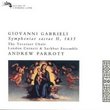| All Artists: Beethoven, Ugorski Title: Diabelli Variations Members Wishing: 0 Total Copies: 0 Label: Polygram Records Release Date: 6/15/1993 Genre: Classical Style: Number of Discs: 1 SwapaCD Credits: 1 UPCs: 028943588126, 028943588126 |
Search - Beethoven, Ugorski :: Diabelli Variations
CD DetailsSimilar CDs
|
CD ReviewsA Diabelli for the ages...and almost no one has heard it John Grabowski | USA | 01/25/2010 (5 out of 5 stars) "I was recently rereading an article that originally appeared in the American Beethoven Society's journal (Spring 1997, Vol. 12 No. 1) wherein someone named Stephen Bergquist evaluates all the then-available recordings of this astonishing work, one of the composer's most enigmatic. He gives top honors to Brendel (!) and of Ugorski and this remarkable recording only says that while the tone is gorgeous, things drag. "There are some gorgeous sounds here, but not much more."
This is why I take mainstream critics with a total grain of salt. (Another periodical, and I believe it was International Piano Quarterly, rated Juana Zayas' limp Chopin Etudes as simply the best set out there. Apparently they'd never heard of a fellow named Cortot, or more recent excellent pianists such as Yukio Yokoyama--both available through Amazon, by the way.) My experience is that "authorities" have limited appreciations and conservative taste, and I truly think that's why they set themselves up as arbiters--to slow everyone else down to their speed through the sheer rhetorical weight of their position (think Wynton Marsalis). There is so much going on in this recording it's really difficult if not impossible to discuss, and I see it has now gone out of print, so that hearing it will be even more difficult for most people. But it is a must if you love this work. This is not a typical approach to the work--the Beethoven Society review gets it right when it says the pianist is wayward. But I find that, in this work, to be a feature, not a bug. Even I can't get past the oddly craggy playing of the simple waltz itself--marked "vivace" in Beethoven's score--or the handling of the first variation, which in Ugorski's hands is sloooow and lacking anything that could be considered majesty (marked marcia maestoso in Beethoven's score). But once one gets past the oddball start (which I admit initially put me off somewhat on this recording) there is so much to hear. First, as the review states, sonically this is a gorgeous interpretation. Ugorski has one of the most amazing bel canto piano sounds out there, as almost all Russians seem to, and he puts it to splendid *intellectual* use in these variations. For example, pedal notes from one variation are sometimes held and "bleed" into the next variation. He does not have pure silence between every variation. Note how he so organically links the first variation to the second via the sustain pedal in a manner I have never heard before; it's a masterstroke. And listen to the entry of the bass at the start of Variation 18!! Pure magic. Other uses of pedals are no less remarkable. In Variation 14, which is Bach-like in style, he gets the left hand to suggest bass notes on a church organ--very atmospheric. Variation 26 invokes the otherworldliness of the late Beethoven sonatas like I've never heard before, and other, more literal-to-the-score interpretations just seem so bland by comparison. When I hear this kind of playing, I don't care if the pianist ignored a marking here or took something a little too slow or fast there. The proof is in the pudding. After all, are we listening to the *music* or the *score*? But Ugorski isn't just impulse. If you listen a few times, you realize there is a very close--almost mathematical or proportional--relationship among various tempi. One variation will be exactly half the tempo of the preceding one, for example. Better than just about any other pianist I've ever heard, Ugorski gives the listener a strong sense of *why* one variation follows another. (Listen to Variation 17 followed by 18.) You can hear ideas extend from variation to variation, and develop, and grow. It doesn't just sound like 33 random riffs on a theme. But the real magic is in the last few slow variations, where Ugorski probes the depths like hardly anyone else I've ever heard. Schnabel comes to mind for serious competition, but Ugorski's tone is better and the sound of the recording, obviously, is better than 1933. I wish he pounded a little harder in the fugue--I think this should be violent Beethoven--but that may be a personal reservation, and it's only slight. But I see this variation to be the piano equivalent of the Grosse Fugue, and believe it should be every bit as rough. Every piano student out there should study Ugorski. And Ugorsi should give more concerts. He is the Howard Hughes of the piano world, sadly. Unfortunately discs like this didn't sell, so then DG tried foisting bon bons on him and when that predictably didn't work, they cut him loose from his contract. I even contacted Klaus Heyman of Naxos and tried to interest him in Ugorski, but he told me he was perfectly satisfied with his catalog of Jen Jandó. I wept that day. While the concert stage is clogged by middle-ground pianists such as Richard Goode and and Leif Ove Andsnes, Ugorski is unknown even to connoisseurs. Sad sad. While this may not be your first choice for a "mainstream" Diabelli (for that my favorite is the first ever recorded--Schnabel 1933) it is certainly a fascinating view of the work. Ugorski manages the dual and seemingly contradictory feat of giving each variation its own distinct personality while unifying the whole, making these disparate miniatures come together as a family--a very eccentric family, perhaps, but definitely a family, one you have to get to know and revisit often to really appreciate. Sound is very pure and clear--all Ugorski recordings seem to sound superior to their general piano releases and I can only conclude that he supervises the recording process very thoroughly. This is one of those desert island, one-of-a-kind discs, the sort "academics" and arbiters of correctness hate. (I wonder how they feel about Schnabel's disastrous attempt to play the first movement of the Hammerklavier at Beethoven's indicated tempo. No one has done this since, wisely.) So if you want a rich Diabelli disc you'll return to again and again, buy this now." |




